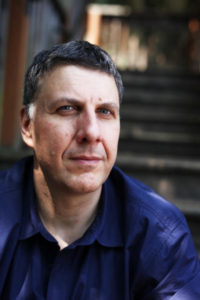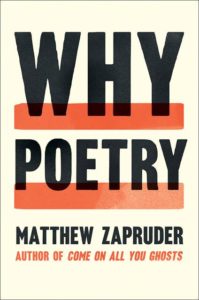A version of this piece appeared in the September 2017 issue of The Practicing Writer.
Addressing People’s Questions About (and Frustrations with) Poetry: Q&A with Matthew Zapruder
By Erika Dreifus

I’m delighted to present the latest PRACTICING WRITER q&a. This month’s feature with Matthew Zapruder also marks the first time we’ve spotlighted practicing writers who are siblings! (You may recall last year’s conversation with author Alexandra Zapruder.)
*Matthew* Zapruder is the author of four collections of poetry, most recently COME ON ALL YOU GHOSTS (which was a NEW YORK TIMES Notable Book of the Year) and SUN BEAR. He has received a Guggenheim Fellowship, a William Carlos Williams Award, a May Sarton Award from the Academy of American Arts and Sciences, and a Lannan Foundation Residency Fellowship in Marfa, Texas. An Associate Professor in the MFA program at Saint Mary’s College of California, he is also Editor at Large at Wave Books, and from 2016-17 held the annually rotating position of Editor of the Poetry Column for THE NEW YORK TIMES MAGAZINE. He lives in Oakland, California. WHY POETRY (Ecco Press) is his latest book.
Please welcome Matthew Zapruder!
ERIKA DREIFUS (ED): Okay, confession time: Again and again, WHY POETRY encourages readers to depart from a common practice: attempting to understand a poem by discerning what it is “about.” Your arguments on this are convincing, but I still feel a bit guilty, because generally speaking, trying to grasp the “about” is something I do almost by instinct. Moreover, I’m remembering that in my experience in prose workshops, anchoring a critique in the “about” can be helpful. So I guess what I’m wondering is this–how do you advise your students to craft critiques, assuming that the “about” question is not exactly central?
MATTHEW ZAPRUDER (MZ): I ask them to try to focus first on the poem itself. First, what is going on? What can we know about who is speaking, where the poem is taking place, etc.? Often that information is available in the title and first lines. If it isn’t, that’s interesting and worth talking about too. Grounding ourselves in that way has two good effects. First, it gives basic information, without which the poem cannot be understood. Second, it reminds us that what is on the page is what we need to experience the poem. There is often a resistance to doing this, as if what is on the page cannot possibly be what the poet “really” means! It’s a bit time-consuming to have to try to convince people that poets mean what they say, but also absolutely essential.
Then, I ask them to look at the poem, and see what seems strange to them. What jumps out, in the language (like an unusual word, or use of a common word), or something formal? Usually that strangeness, that difference, is key to getting deeper into the poem. These sorts of conversations are so much more productive and interesting than immediately jumping to what the “theme” or big idea of the poem supposedly is. Ultimately of course we will end up talking about big ideas and meaning and even what the poem is “about,” but we will be grounded in the movement of the poem itself.
ED: At one point in WHY POETRY, you recall a time in your life when you “embraced the possibility that writing in rhyme and form would solve the problem of how to make a poem: follow the instructions, and learn how to write formal poems better and better, until [you] would become a ‘poet.’ To that end, you write, you “carried around a rhyming dictionary, writing terrible sonnets, lousy sestinas, atrocious villanelles, abysmal pantoums.” You say that you as though you were working, “which was good, but it was also painful and embarrassing.” You note: “I didn’t realize then that I was doing my own clumsy version of what art students do when they learn to paint. Now, whenever I go to the museum I usually see at least one of them with a sketchbook, copying the great paintings, and it makes sense to me.” Knowing what you know now: Would you repeat that apprenticeship if given the chance? Is it something that you recommend to others? To your students? Why or why not?
MZ: Yes, I would repeat it. It was a great way to teach myself. And I do (gently) recommend that to students. I’m not a big fan of the stern, “you have to learn to do formal poetry before you are allowed to make the poetry you want” type of advice. It’s patriarchal and annoying. And also not true. The last thing I want to do is to take the fun out of making art. But I do believe that this would be a good thing for anyone to try, at least for a little while. Who knows, maybe they will turn out to be formal poets! Or at least they will learn things about how a poem moves that they would not have otherwise.
ED: What’s your biggest hope for WHY POETRY?
MZ: Hm. I think actually I achieved my biggest hope, which was to prove to myself that I could complete a sustained book-length project that addressed directly the questions and frustrations people have with poetry. It was a very difficult project for me: I don’t concentrate that well, which is why writing poems (with their quicker movements, for which distractibility might actually be an advantage!) is something I am better at. It was also an immensely complex and daunting topic. But it was something I wanted to do, and the fact that I was able to write the book in a way I can feel (mostly) good about, is gratifying. Now, if people read it and get something out of it, that will mean the world to me too.
ED: You’ve recently completed a term (if that’s the correct word?) as poetry editor for THE NEW YORK TIMES MAGAZINE. Please tell us a bit about that experience–how you came to occupy that position and how you selected each week’s poem.
MZ: One day I got an email from the editor of THE NEW YORK TIMES MAGAZINE, asking if I was interested. I was quite surprised, because Natasha Trethewey was doing [the job], and I didn’t realize it was an annually rotating position. The first thing I did was ask every publisher I knew, big and small, to send me books. The poems in the MAGAZINE are reprinted from recently published or forthcoming books, so I wasn’t reading any unpublished work. I was looking for poems that could function in that space, that would announce themselves amid a lot of prose. This eliminated a lot of great poetry, poems that work better in the context of a book, or when a reader is more prepared. I got better during the year at identifying those poems. They also had to be short-ish, to fit in that quarter page space. I read a lot each week: My office quickly filled with giant piles of books. I was looking also for a diversity of approaches, some poems that were more lyric or even obscure, some that rhymed or were otherwise formal, some that were overtly political, some written by more established poets and some written by younger ones. I just tried to mix it up and keep it interesting.

ED: What’s next for you?
MZ: What’s next for me is a very busy fall of touring, for WHY POETRY. I have events coming up in the Pacific Northwest, my current hometown Bay Area, Los Angeles, New York, D.C. (where I grew up), Providence, Boston, etc. Anyone who wants to come say hi can see details at my website.
ED: Thank you so much, Matthew!
Please visit Matthew Zapruder’s website to learn more about him/his work. My thanks to Matthew and publicist Michael Taeckens for the advance reading copy of WHY POETRY.